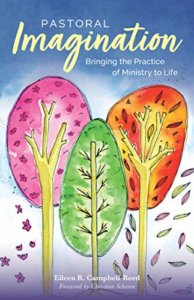Eileen Campbell-Reed explains why cultivating good questions is a key skill for ministry leaders. She outlines three types of questions essential to building understanding and empathy and discerning the way forward. When we take time to pay attention patiently and deeply, we can discover that there is much more going on, much more to discover about the person or situation, much more to notice about the presence of the holy.
When asked what really helped in his preparation for ministry, a Lutheran pastor recalled interviewing one of his seminary professors. The professor said he believed what students need to know is that they should become “cultivators of ministry questions.” A significant part of ministry, said the professor, is “being able to engage in thoughtful and meaningful ways the questions that people are having in their lives right now and being able to speak to them in a variety of creative and insightful ways.”
Getting to the “more” of the situation
In ministry, teaching, and lots of other professions, if we want our presentations to be more than one-sided monologues, both asking questions and inviting questions is important. There are many ways I’ve learned that asking questions will get you further. This approach is not just a matter of making progress but a matter of getting to the “more” of the situation.
When I speak of the “more” in a situation, I am not simply referring to something hidden, secretive, or what a critical theorist might call “deep structure.” Instead, I am simply signaling that in speaking or acting, we often use shorthand. When we take time to pay attention patiently and deeply, we can discover that there is much more going on, much more to discover about the person or situation, much more to notice about the presence of the holy. Philosopher of religion William James makes an exploration of “the more,” and he observes, “Apart from all religious considerations, there is actually and literally more life in our total soul than we are at any time aware of.”
Cultivating good questions can get us further in noticing “more” about three crucial components of the practice of ministry: understanding, empathy, and discernment.
Understanding
When phrased right, thoughtful questions lead to more understanding in complex or escalating situations. Recently while my husband and I were navigating an unexpected situation with our daughter who was at sleepaway camp, we needed better understanding in order to make the best decisions. We needed to talk to more people and ask more questions. We asked clarifying questions, information-gathering questions, and direct yes or no questions. My husband and I asked each other questions about possible scenarios, and we wondered who could give us the help we needed. Fortunately, asking more questions led us to better information and more clarity.
Empathy
The situation like the one we faced with my daughter was complex and required greater understanding. Many ministry situations are multifaceted, and they call for skill in listening in order to understand people. Empathy takes patience and a willingness to “not know” until someone tells us or shows us what they are thinking, feeling, and experiencing. During the complicated situation with our daughter, I needed to ask many honest, open-ended questions to reach real empathy with my husband. He was having a very different emotional experience than I was having, and it took listening to grasp the “more” of what he was thinking and feeling. The more empathy I cultivated with him through the questions I asked, the more ready I was to support the direction that his intuition said we should go.
Discernment
In the end, we needed both greater understanding of the situation and greater empathy with each other in order to reach a decision about how best to care for our daughter. We asked a lot of versions of “What is the best/right/most helpful thing to do?” We weighed out all the options and, in the end, it was abundantly clear what we needed to do. And we did it. Getting further with empathy for each other and grasping the complexity of the situation really helped us discern the right choice.
Whether you are an activist, chaplain, congregational minister, or nonprofit ministry leader, the practice of ministry nearly always requires discernment about how to lead a community; how to understand the “more” of the situation; how to hear the experiences, feelings, and ideas of the people involved; and, finally, how to decide what to do and how to take action. Thoughtful, intentional questions can lead the way in every case.
 This material is excerpted and condensed from Pastoral Imagination: Bringing the Practice of Ministry to Life (Fortress Press, 2021) by Eileen R. Campbell-Reed. Used by permission. The book is available at fortresspress.com.
This material is excerpted and condensed from Pastoral Imagination: Bringing the Practice of Ministry to Life (Fortress Press, 2021) by Eileen R. Campbell-Reed. Used by permission. The book is available at fortresspress.com.
A companion Pastoral Imagination Journal is available as a print and e-book only at the Three Minute Ministry Mentor website. The full color 8″x10″ journal includes questions from all 50 chapters of the book and space to write reflections.
Related Resources
- Right Questions for Church Leaders E-book by Lovett H. Weems, Jr.
- Fruitful Leaders Ask Questions by Daniel M. Cash and William H. Griffith







